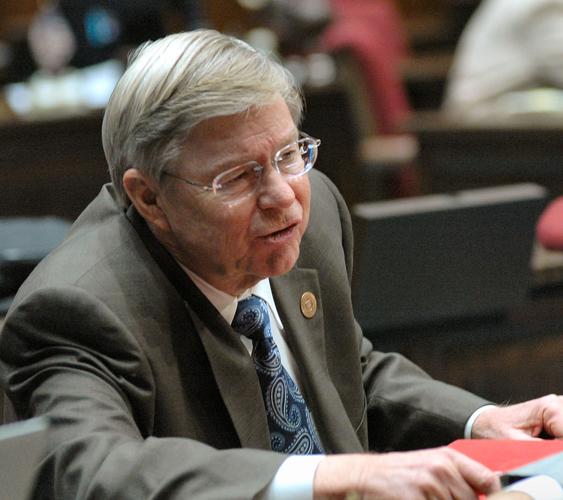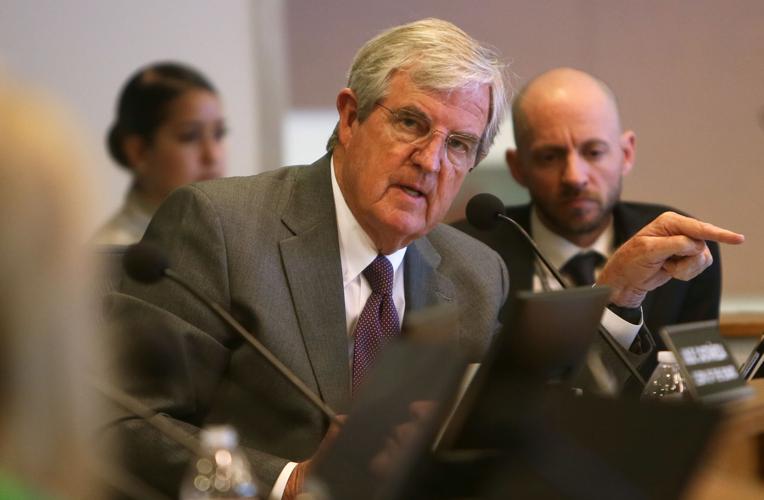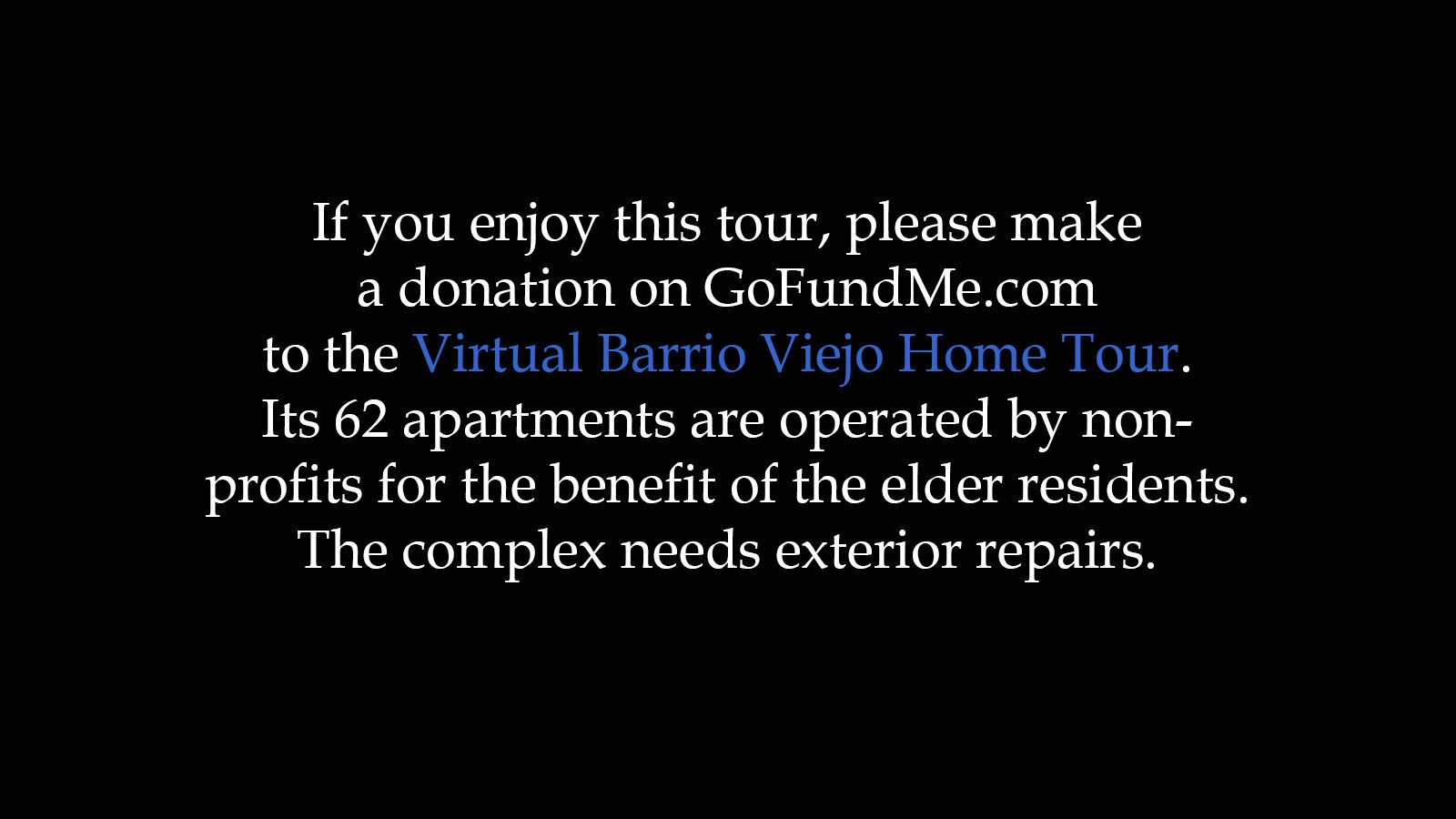A Southern Arizona lawmaker wants to know whether Pima County employees have a First Amendment right to financially aid candidates for county office.
State Sen. Vince Leach, R-Tucson, said he has received inquiries from some individuals. They question whether the fact they are paid by county government means they are effectively silenced from using their dollars to elect those running for the Board of Supervisors, sheriff, assessor, recorder or any other county position, he said.
Leach said he personally believes — and says courts have decided — that money is the equivalent of speech, which is constitutionally protected. But he conceded he is not clear how far that goes — and whether the county can force its workers to give up some of their rights.
“I have my opinion,” he said.
So does Pima County Administrator Chuck Huckelberry. He said there is a good reason for the rules, which have been on the books for decades.
“It’s really to keep folks who are running for local office, who could be the supervisor of a particular employee, from putting pressure on that employee to make a contribution,” Huckelberry said. “It’s been in place as long as we’ve had a merit system.”
That system, Huckelberry said, is based on the idea that hiring and promotion practices are based on merit, “not on political favoritism.”
Put more simply, having a system that opens the door for personnel practices to be affected by political contributions “is not dissimilar to similar political patronage,” he said.
Huckelberry acknowledged that the ban applies not just to people trying to affect the outcome of the particular race to head the agency where they are employed.
Star senior editor Debbie Kornmiller had 16 four-legged visitors at her home near Sabino Canyon in October. (Video: Debbie Kornmiller / Arizona Daily Star)
More: Photos that prove javelinas are the cuties of the desert
So, for example, someone working in the Transportation Department, which is headed by an appointed director, could not put money into the race for county attorney. But he said the broad ban is justified.
“In our system, employees are mobile,” Huckelberry said. “And there’s no prohibition from an employee competing for and receiving a promotion to where that person could basically be promoted into a department with an elected official.”
Huckelberry said the Board of Supervisors itself reviewed the policy within the past two months and decided to keep it in place.
“The concept is, it’s just a good management practice,” he said.
He pointed out there is a similar ban in the Hatch Act, which governs political activities allowed or prohibited for federal employees.
That is not the case at the state level, however, where personnel rules specifically allow donations to candidates but also permit employees of state government to circulate nominating and recall petitions.
Huckelberry acknowledged that the county rules are so broad they bar workers from contributing to the candidates for the Board of Supervisors, officials who have no direct authority over hiring and firing line employees but who set the broader policies for how the county is run.
“But you also have the potential of putting undue pressure on employees to make political contributions for purposes of political patronage,” he said. “And I think that outweighs the former.”
Leach, for his part, said too much is being made about the link between political donations and favors — and not just in employment.
“Any form of donations will always be attacked as whatever you want to attack it on, whether it be ‘you can’t be a (sheriff’s) deputy’ or ‘does it give you access’ or ‘will you run a bill because I gave XYZ money,’ ” he said.
A spokesman for Arizona Attorney General Mark Brnovich said he cannot say when a formal opinion might be issued in response to Leach’s request.
Photos: Take a virtual tour of these Barrio Viejo homes in Tucson
Barrio Viejo virtual home tour
Updated
Welcome to the Barrio Viejo virtual home tour, benefitting the neighborhood’s Lalo Guerrero elder apartments. More about that later, but let’s get started with the tour, which features homes built from the 1880s right up until last year.
Barrio Viejo virtual home tour
Updated
This recently restored 1911 adobe on South Meyer Avenue was the childhood home of Eduardo “Lalo” Guerrero, the father of Chicano music. He lived most of his adult life in Los Angeles, but a barrio complex of apartments for seniors was named in his honor in 2003. This Barrio Viejo virtual home tour benefits the neighborhood’s Lalo Guerrero elder apartments. Find the fundraiser here.
Barrio Viejo virtual home tour
Updated
Owners Amanda and Luke Kippert replaced the home’s roof and electrical system, installed air conditioning and made other major improvements in an Art Deco style. Danny Quihuis of Quihuis Architecture Co. helped with the project.
Barrio Viejo virtual home tour
Updated
Guerrero, in the two photos on the left, was born Christmas Eve 1916. He learned to play the guitar when he was nine and by 17 wrote and performed what would become one of his most famous songs, “Canción Mexicana.” The 1936 musician comedy “The Gay Desperado” was filmed on South Meyer Avenue in a part of the barrio later torn down for construction of the Convention Center.
Barrio Viejo virtual home tour
Updated
Pops of gold throughout the house give it glamour.
Barrio Viejo virtual home tour
Updated
Notice the fancy gold feet on the old bathtub?
Barrio Viejo virtual home tour
Updated
The pièce de résistance of the Lalo house is the patio mural by Sal Sawaki of Wagon Burner Arts.
Barrio Viejo virtual home tour
Updated
“Hot Pink Neighbor” by Ron Kenyon. He is a member of the Tucson Barrio Painters, a group of “plein air” painters who have long appreciated the architecture of the city’s barrios. Three years ago, as they noticed accelerating changes, they decided to make a more organized effort to capture the barrios on canvas.
Barrio Viejo virtual home tour
Updated
This house, built in the 1880s, had become a near-ruin by the time it was restored over three years in the early 1980s. Walls had to be rebuilt, and the original dirt, clay and manure roof removed. The cabinets were salvaged from the long-gone Damsky Cigars shop on East Congress Street.
Barrio Viejo virtual home tour
Updated
Many old barrio homes are built on the lot lines, leaving no front or side yards. But shady back patios are common.
Barrio Viejo virtual home tour
Updated
Notice the thickness of the adobes that case the windows. The ceilings are saguaro ribs.
Barrio Viejo virtual home tour
Updated
“Four doors” by Denyse Fenelon. “Barrio communities should be nurtured and appreciated for the architecture, lives and stories that have happened here. It’s hard to save what you can’t see so we’re attempting to preserve, in our way, the story of Tucson,” writes Fenelon, organizer of the Tucson Barrio Painters.
Barrio Viejo virtual home tour
Updated
Several dozen homes have been built in the barrio in the past 15 years, either on lots where houses had been demolished years before or on land that had always been vacant. This house was built in 2017 by a couple that already had family connections to the barrio.
Barrio Viejo virtual home tour
Updated
The living room and kitchen are part of an open-concept area designed for family gatherings.
Barrio Viejo virtual home tour
Updated
The kitchen takes advantage of the home’s high ceilings. That’s another nod to the design of many of the barrio’s oldest buildings.
Barrio Viejo virtual home tour
Updated
Luis H. Ibarra of Saavy Inc. was the general contractor.
Barrio Viejo virtual home tour
Updated
A Tucson-made patio bench gives the home a sense of place. “Be Kind” is the motto of the beloved Ben’s Bells project.
Barrio Viejo virtual home tour
Updated
From the street, the home hews to a traditional Sonoran style. It is built on the lot lines and has a flat roof. But the patio shows that is a modern structure.
Watch now: Peek inside this Barrio Viejo home near downtown Tucson
UpdatedFind more Barrio Viejo homes at tucson.com/barrioviejo (Video by Gloria Knott, Arizona Daily Star)
Barrio Viejo virtual home tour
Updated
Barbara Mulleneaux recently painted this long-vacant building at West Kennedy Street and South Meyer Avenue.
Barrio Viejo virtual home tour
Updated
This pre-1888 front room opens to the kitchen and dining area, then a laundry with an adjacent bathroom, and finally the rear bedroom and a doorway to the central courtyard. Years ago this type of design was referred to as a shotgun because the rooms line up like the long barrel of a shotgun. Brick floors have replaced the original wood floors, but the variegated light & dark gypsum interior plaster is a longtime Old Pueblo tradition.
Barrio Viejo virtual home tour
Updated
This chandelier highlights the rough-sawn fir joists and old-growth planks a full 2 inches thick. Ceilings nearly 12 feet high kept hot air high in the summers when many Tucsonans slept outdoors on canvas cots or improvised hammocks.
Barrio Viejo virtual home tour
Updated
Till the 1990s this adobe room had two feet of dirt above its fir joists and packing crate planks. That was its original roof. One of the planks still visible today is addressed to "Geo. Martin", Arizona's second druggist.
Barrio Viejo virtual home tour
Updated
A clean, sleek bedroom for this old house.
Barrio Viejo virtual home tour
Updated
Large skylights with white domes provide soft, diffused light for this kitchen, which has no windows. The room originally opened to a long porch 7 feet in depth, but early 20th century additions closed off even that bit of light, so skylights were an adaptation.
Barrio Viejo virtual home tour
Updated
This iron fence recycles old gas and water pipe salvaged from a large complex of former apartments restored from 1998-2000. Some of the adobe walls had collapsed, and the property was condemned. Designer-builder David Carter's material costs for the fence totaled just under $19 for the caps on the posts. Welder Jim Fredd was the fabricator.
Barrio Viejo virtual home tour
Updated
José Trujillo built this market in the western part of the barrio in the 1920s. It eventually became apartments -- including home to motorcycle riding tenants who changed oil in the living room -- an addiction-counseling center, a bed-and-breakfast and a home. This painting is by Dina Jasensky.
Barrio Viejo virtual home tour
Updated
Joyce Nelson painted “Las 4 Esquinas,” one of the most iconic buildings in the barrio. Grocers or general shops were at three of the four corners at West Simpson Street and South Convent Avenue as far back as 1888. It isn’t clear when the building was first called Las 4 Esquinas, but it carried that name by 1917 at the latest. It was operated by Don Wah and his wife, Fok Yut Ngan, both Chinese immigrants.
Barrio Viejo virtual home tour
Updated
This 900-square-foot adobe was built before 1920. This is how it looked until about two years ago.
Barrio Viejo virtual home tour
Updated
The new owners who restored the house say they were inspired by homes in San Miguel de Allende, Mexico.
Barrio Viejo virtual home tour
Updated
Many interior items, such as lights and this sofa, were second-hand finds.
Barrio Viejo virtual home tour
Updated
A kitchen right out of Mexico.
Barrio Viejo virtual home tour
Updated
The homeowners’ next project is to build a new sister structure on the same property. Follow their work on Instagram at weboughtanadobe.
Barrio Viejo virtual home tour
Updated
Russell Recchion painted this building at Convent and Simpson.
Barrio Viejo virtual home tour
Updated
The vigas (wood beams) in this house were salvaged from trees burned in the 2002 Mount Lemmon fire. The home was built 10 years ago. The painting shows Miguel Hidalgo y Costilla, the father of Mexican independence. It was salvaged nearly 40 years ago from the Los Reales landfill.
Barrio Viejo virtual home tour
Updated
Niches are common elements in older Mexican homes.
Barrio Viejo virtual home tour
Updated
The homeowners were walking in Guadalajara, Mexico, when they spotted workers installing a new roll-up garage door. The old iron gates were piled next to the street as trash. Shipped to Nogales by rail, they are now part of the back patio.
Barrio Viejo virtual home tour
Updated
This brick barrel vault was erected in three weeks without any formwork or other support. Every brick was set in place over thin air. Not till each row received its last brick was that row an arch -- a substantial structure.
Barrio Viejo virtual home tour
Updated
Norm Sherwood painted the long-unused Teatro Carmen at 348 S. Meyer. It was built in 1915 by Carmen Soto Vásquez and was an elegant theater seating up to 1,400. Performers came from as far as Mexico City to appear in plays and operas. By about 1920 it became a movie theater and also hosted dances and boxing matches. It later became a garage and then the Black Elks Lodge.
Barrio Viejo virtual home tour
Updated
This home was designed by Sonya Sotinsky of FORS architecture + interiors as envisioned by its owners and built in 2015 on a vacant lot by Jamie Olding of Building Excellence, LLC.
Barrio Viejo virtual home tour
Updated
Mike Runde of The Runde Company built the Rumford fireplace, which is tall and shallow to reflect more heat. Homeowner Joe Patterson started the painting on the right, of John Street in Hartford, Conn., in about 1987. It was not quite finished, but his spouse, Kathleen McNaboe, framed it anyway. After they moved to the barrio, Joe removed the frame and completed his piece.
Barrio Viejo virtual home tour
Updated
Mike Tanzillo of Tanzillo and Son built cabinets and millwork work the house, which has a modern interior with steel counters and polished concrete floors.
Barrio Viejo virtual home tour
Updated
The kitchen is part of the light-filled great room.
Barrio Viejo virtual home tour
Updated
The office looks into a courtyard with a variety of fruiting trees.
Barrio Viejo virtual home tour
Updated
High ceilings help make the bedroom spacious
Barrio Viejo virtual home tour
Updated
This bathroom is tucked behind the bedroom.
Barrio Viejo virtual home tour
Updated
David Rojo of Rojo Construction LLC built the home’s metal planter boxes. The outdoor tile art is by Carly Quinn of Carly Quinn Designs.
Barrio Viejo virtual home tour
Updated
The home’s exterior celebrates the rich history of the barrio with hard troweled hand plaster and wood gates and shutters.
Barrio Viejo virtual home tour
Updated
“Two Minutes to 5 Points,” by Terri Gay refers to the five-way intersection of 18th Street and Stone and Sixth avenues.
Barrio Viejo virtual home tour
Updated
Back in 2014, the Star’s Tom Beal chose saguaro ribs as one of 100 objects that define Tucson. Here’s how he explained it: “Saguaro ribs were functional in early Tucson, where wood and metal were hard to come by before the railroad arrived in 1880. The ribs of the saguaro cactus, with an insulating layer of grass and native dirt piled atop them, served to fill in the spaces between roof beams hauled from nearby mountains. In Spanish, the beams are called “vigas” and the lateral pieces “latillas.” The ceilings of sleeping rooms were often covered with a sheet of muslin to keep the dirt from falling into your mouth as you snored away at night. You’ve no doubt seen the durable ribs on dead saguaros after the flesh falls away.” Ribs are still found in many of the barrio’s oldest homes.
Barrio Viejo virtual home tour
Updated
Integral color was mixed with gypsum and perlite to create this variegated plaster.
Barrio Viejo virtual home tour
Updated
Barrio painter Peter Farrow’s take on Las 4 Esquinas.
Barrio Viejo virtual home tour
Updated
This is one of four homes developed by Warren Michaels on the site of what had been a bakery. Rob Paulus was the architect and Dave Taggett the builder. The walls are Mikey Block, a lightweight but strong material with high thermal value.
Barrio Viejo virtual home tour
Updated
The “Tucson” letters are from the old Greyhound bus station. The homeowners, Laura Walton and Dave Hamra, found them at Gather, A Vintage Market.
Barrio Viejo virtual home tour
Updated
La Fortuna, the original bakery on this South Meyer Avenue site, was started by the Figueroa family in the 1920s.
Barrio Viejo virtual home tour
Updated
Artist Poe Dismuke of SamPoe Gallery in Bisbee created the high-flying cicada.
Barrio Viejo virtual home tour
Updated
The patio is designed after traditional barrio gardens with pomegranate and figs trees, and a ramada of mesquite and ocotillo supporting gravevines. It also includes a modern water-harvesting system.
Barrio Viejo virtual home tour
Updated
Johanna Martinez honors the property’s history with the La Fortuna mural.
Barrio Viejo virtual home tour
Updated
“Simply Green” by Barbara Mulleneaux. The home is on South Meyer Avenue.
Barrio Viejo virtual home tour
Updated
This is one of nine condos in a complex built in the 1880s as a livery and bunkhouse for the Palace Hotel, which was seven blocks north in the heart of downtown. In those days, when visitors came to town on horses, it wouldn’t do to keep animals right next to a nice hotel.
Barrio Viejo virtual home tour
Updated
The complex’s fireplaces weren’t built to today’s code standards, so they are decorative rather than functional.
Barrio Viejo virtual home tour
Updated
Designer Linda Robinson, winner of the Master of the Southwest award from Phoenix Home & Garden, advised the homeowner on the interiors.
Barrio Viejo virtual home tour
Updated
Many of the furnishings and lights are from Adobe House Antiques and Arte de la Vida. The home’s custom window hardware is by Perry Luxe.
Barrio Viejo virtual home tour
Updated
Picture-rail moulding along the walls means there’s no need to drill into the plastered adobe to hang art.
Barrio Viejo virtual home tour
Updated
Terri Gay painted this vacant house at West Cushing Street and El Paso. Most members of the Tucson Barrio Painters have social media accounts or web sites. Search individual names for more information about their art.
Barrio Viejo virtual home tour
Updated
The Lalo Guerrero apartments at West 18th Street and South Convent Avenue are on the site of the original Samuel Drachman Elementary School. It was built in 1901 as a four-room school but expanded over the years. Fire destroyed 80 percent of it in 1948. It was rebuilt but had fallen into disrepair by 1997 when a new school was constructed three blocks south.
Barrio Viejo virtual home tour
Updated
All but the central facade of the school was demolished just before its 100th anniversary. Federal and state grants and loans paid for construction of the 62 apartments now on the site. Pio Decimo and Barrio Viejo Elderly Housing Inc, non-profit corporations, operate the apartments on behalf of their residents.
Barrio Viejo virtual home tour
Updated
Eduardo “Lalo” Guerrero attended Drachman in the 1920s and also the dedication of the apartments in 2003. World famous as a singer, songwriter and guitarist, he died in 2005.






